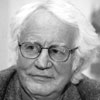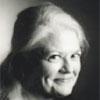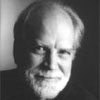| FEATURE |
 |
Richard Jackson |
|
|
"Language-Driven Poetry: AN INTRODUCTION TO THE PRINCIPLE OF
GENERATING POEMS" begins with Dante and Petrarch and walks us through poems of Wordsworth, Keats, Robert Frost, Andre Breton, Cesare Pavese, Richard Wilbur, Wislawa Szymborska, Anna Akhmatova, all the way to Heather McHugh to demonstrate that the imaginative vision possible to us through poetry exists not in the dressing up of ideas, feelings or events that the poet tries to find words to describe, but in its exploration of language, "not merely a record, but a gesture always trying to escape itself, escape our human condition towards something universal�"
|
Richard Jackson |
 |
"Place Message Here",
"Letter From Slovenia",
"Letter From Tuscany",
"Letter to Stern From Arezzo",
and "If I Can't Love You", all new poems by Richard Jackson |
Robert Bly |
  |
An interview by Paula Gordon and Bill Russell, a special audio
program of The Paula Gordon
Show. |
Christian
Wiman |
 |
"A Darker Shade of Grey:
Christian Wiman�s Hard Night," a review by Chelsea Rathburn
points to Wiman�s work as expression of the poet�s awesome
responsibility to the power of language. "What words or harder gift/
does the light require of me," Wiman writes, "carving from the dark/
this difficult tree?"
HARD NIGHT Copper Canyon Press, 2005.
|
| |
|
|
|
|
|
|
Robert Bly
|
|
|
 Robert Bly, among America’s
foremost poets, has been writing poetry for 50 years.
Between Silence in
the Snowy Fields (Wesleyan University
Press, 1967) and the ghazals collected in My
Sentence Was a Thousand Years of Joy
(Harper Collins, 2005) are numerous books of
poetry. The
Insanity of Empire: A Book of Poems Against the
Iraq War (Ally Press, 2004),
continues his lifetime commitment to political
activism. His other books include Iron
John (Perseus Books, 1990), The
Sibling Society (Addison-Wesley,
1996), influential translations and anthologies. Mr.
Bly's many honors include the National Book Award and
two Guggenheim fellowships. He lives in Minneapolis,
Minnesota, where he continues to write. Robert Bly, among America’s
foremost poets, has been writing poetry for 50 years.
Between Silence in
the Snowy Fields (Wesleyan University
Press, 1967) and the ghazals collected in My
Sentence Was a Thousand Years of Joy
(Harper Collins, 2005) are numerous books of
poetry. The
Insanity of Empire: A Book of Poems Against the
Iraq War (Ally Press, 2004),
continues his lifetime commitment to political
activism. His other books include Iron
John (Perseus Books, 1990), The
Sibling Society (Addison-Wesley,
1996), influential translations and anthologies. Mr.
Bly's many honors include the National Book Award and
two Guggenheim fellowships. He lives in Minneapolis,
Minnesota, where he continues to write. |
|
|
Robert Bly - Interview |
 |
|
Rhyme and Sense
An interview excerpted from the
conversation led by Paula Gordon and Bill Russell of The Paula Gordon Show:
Conversations with People at the Leading EdgeSM
Listen to the full program: (requires Real Player)
Part 1, Part 2, Part 3, Part 4, Part 5, Part 6
Atlanta / November 13, 2005
Paula Gordon: Nature
and culture are equally worthy subjects for poems,
says Robert Bly, an eminent American poet, translator
of poetry and literary editor. Fifty years ago, Mr.
Bly's Silence in the Snowy Fields
established his fame, now he celebrates European
culture in the ancient Islamic ghazal
("GU-zul") form.
Robert Bly: One of the things
I love about the Islamic world is the amount of
praise that's in it. A little poem
"Shabistari and The Secret Garden" ends
like this:
Robert, those high spirits don't prove
that you are
A close friend of truth, but you have learned
to drive
Your buggy over the prairies of human sorrow.
One thing that both reading and great art
helps us to do is to '...drive our buggies over
the prairies of human sorrow.' And at the same
time, we're not caught in that sorrow, we drive
our buggies over them and pass them. But our
children KNOW if we are able to feel the depths
of the sorrows of our ancestors and even those of
our parents. And they appreciate that.
PG: Mr. Bly
is deeply concerned about those children.
RB: What you are witnessing
is a loss--losses of what our grandfathers and
grandmothers knew. One of those losses is
reading. Another is the idea that there's nothing
else beside the rotten marketplace. We've lost
the idea that there is a depth, something below
and something above.
The adults have betrayed the children.
We've sacrificed the young ones to this stupid
idea that the media deserves attention.
Television dumps junk into the minds of the
young. What is it, three hours a day is the
normal amount children today watch television?
It's human filth, being poured in by these
optimistic idiots who run the television shows
and don't care about humanity. Do not care at
all. You should allow your children a maximum of
20 to 30 minutes a day of television viewing. The
rest of the time, you say, 'If you don't read,
you don't eat, make up your mind.'
What will it be like to live in a country where
no one reads? Adults have simply copped out of
their responsibility, become children themselves.
It's very hard to find an adult any more, when
the adult would be a person who says, 'The
children need to learn to read!' Instead, the
children simply sit there, absorbing that
television, without having to do ANYthing. It's a
murder of the human psyche!
PG: Can
poetry save us from the error of our ways?
RB: No. Poetry is a reminder.
It's a small thing. But it insists on the
important things in life. Rainer Maria Rilke
says,
Sometimes a man stands up during supper
And walks outdoors. And keeps on walking
Because of a thing that stands far in the
East.
And his children say blessings on him,
As if he had died....
I LOVE that poem of Rilke's because it says
that at a certain point in everyone's life, you
need to get rid of the washing machine and your
obsession with the washing machine, and you need
to head toward that place in the East. And that's
not what's happening. What we need to do is do a
LOT of grieving.
PG: And
when the grieving is complete?
RB: Some form of praising
takes place. Those who are unable to grieve
cannot praise. If you grieve your parents enough,
then you're able to praise them and not hold all
those miserable little angers you had against
them.
One problem with philosophers -- they don't laugh
enough. I was VERY surprised to find out, as my
poems pick up more and more of the past of human
beings, the ancient culture, more and more of the
grief and the suffering of human beings -- the
poems become funnier! I don't understand that,
but I LOVE it. I feel that there's some way that
as the mind gets more mature, in the midst of a
lot of grief, it's able to dance a little!
� 1997-2006 The Paula Gordon Show
 Paula Gordon's days as a
television host culminated with an Emmy nomination in
1977 for "Small World," a weekly half-hour
show on Chicago’s WMAQTV, NBC’s owned and
operated station, where she was also a station
announcer. She then spent almost two decades in
the business world as she and husband Bill Russell
created, built, then sold one of the Southeast’s
premier film and video companies. Producer and
host of The Paula Gordon Show, Paula also
leads The Clarion Group, a business consultancy. A
Midwesterner, she lives with her husband live in
Atlanta. She is the host of Musical Wonders
from the Oberlin Conservatory of Music. Paula Gordon's days as a
television host culminated with an Emmy nomination in
1977 for "Small World," a weekly half-hour
show on Chicago’s WMAQTV, NBC’s owned and
operated station, where she was also a station
announcer. She then spent almost two decades in
the business world as she and husband Bill Russell
created, built, then sold one of the Southeast’s
premier film and video companies. Producer and
host of The Paula Gordon Show, Paula also
leads The Clarion Group, a business consultancy. A
Midwesterner, she lives with her husband live in
Atlanta. She is the host of Musical Wonders
from the Oberlin Conservatory of Music.
 In addition to being co-host of The
Paula Gordon Show, Bill Russell serves
as the research vice president of Clarion Group with
particular expertise in information systems and
infrastructure support. Bill's degree in systems
engineering from Stanford University ('68) was a
springboard for a lifetime supporting the knowledge
and communications needs of corporations, from
designing systems solutions for Levi Strauss, to
start-up companies and state-wide broadcast
television programming. A world traveler, Bill serves
as President of Public Intelligence, Inc. and of
Investigations Group, Inc. He was born and
raised in Alabama. In addition to being co-host of The
Paula Gordon Show, Bill Russell serves
as the research vice president of Clarion Group with
particular expertise in information systems and
infrastructure support. Bill's degree in systems
engineering from Stanford University ('68) was a
springboard for a lifetime supporting the knowledge
and communications needs of corporations, from
designing systems solutions for Levi Strauss, to
start-up companies and state-wide broadcast
television programming. A world traveler, Bill serves
as President of Public Intelligence, Inc. and of
Investigations Group, Inc. He was born and
raised in Alabama.
|

|